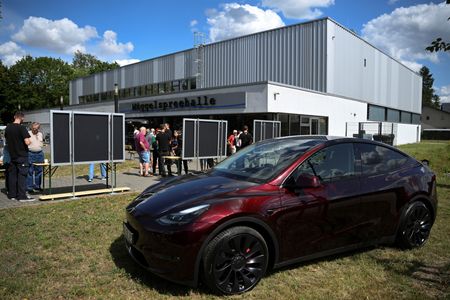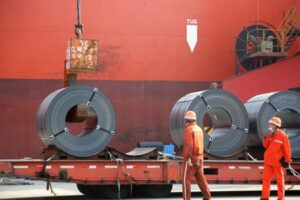By Victoria Waldersee, Nette Noestlinger and Leon Malherbe
GRUENHEIDE, Germany (Reuters) -Tesla on Tuesday sought to assuage Brandenburg state residents’ concerns by holding a question-and-answer session on the EV maker’s planned expansion that would make its local plant the biggest car factory in the country.
Tesla, which currently produces around 5,000 cars a week, hopes to double the plant’s production capacity to 1 million vehicles a year and add 50 gigawatt hours of battery production capacity, though it has not provided a timeline.
Ramping up output at its first European production hub is crucial to Tesla’s goal of vanquishing market leader Volkswagen, whose largest plant in Wolfsburg has capacity for 800,000 vehicles but last year produced only around 400,000.
While Volkswagen still holds the highest EV market share in the region, Tesla is making its mark. Its Model Y was the best-selling car in Europe in the first quarter of the year.
Tesla workers answered queries from locals on issues from water use and biodiversity protection to the environmental impact assessment for the expansion, in an attempt to address concerns that could hold up its application to local authorities.
The first phase of the plant’s construction was delayed due to the high number of objections from local citizens, mostly related to environmental concerns.
Tesla has long argued that the plant’s impact is relatively low and referred to the benefits of EVs in combating climate change.
The carmaker is due to publish the full application for the expansion on Wednesday, and citizens have until mid-September to file objections.
Tesla on Tuesday said the planned expansion covers a new 700-by-700-metre production space, around double the size of its current production hall, and could entail increasing its staff to 22,500, from around 10,000 now.
The attendees’ main concern at Tuesday’s event was how the carmaker will manage to expand the plant without using additional water, which Tesla has said it will achieve by recycling the 1.4 million cubic metres of water it is licensed to use.
“I keep my animals here for hunting and not even they get enough water. We just don’t have enough,” Emily, a 23-year-old attendee, told Reuters during the meeting.
Still, others were more optimistic.
“Water isn’t a Tesla problem – it’s a general problem,” said 68-year-old local resident Matthias Handschick. “If the recycling works, that’s good – we need these solutions.”
(Reporting by Victoria Waldersee, Nette Noestlinger and Leon Malherbe in Gruenheide, GermanyWriting by Christoph SteitzEditing by Louise Heavens and Matthew Lewis)





